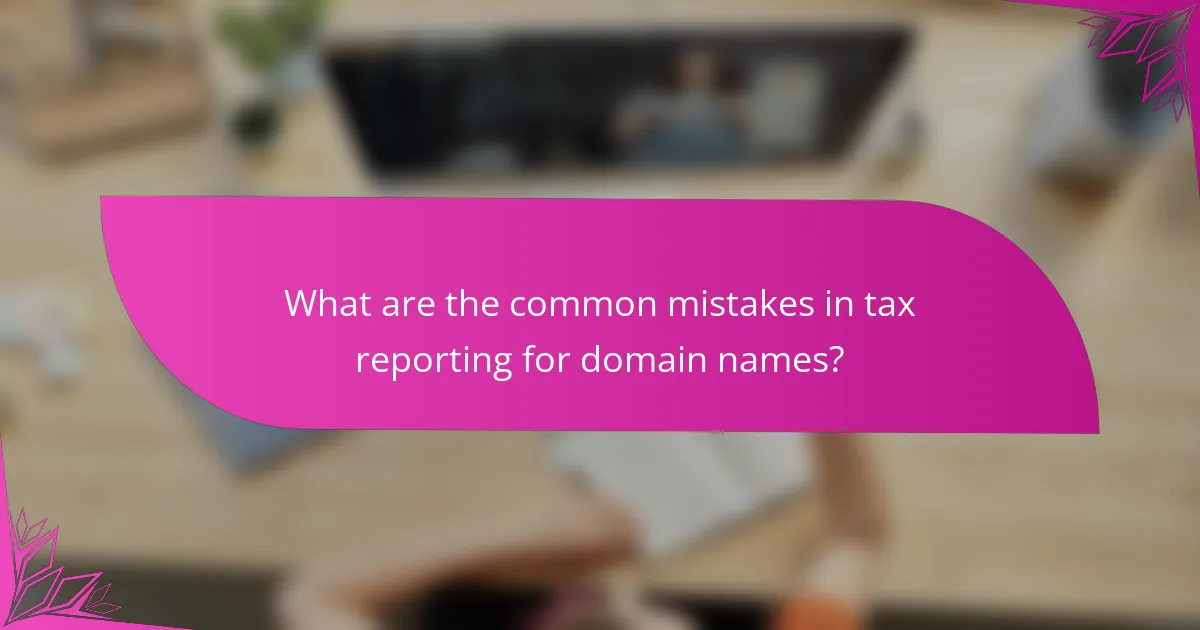US tax laws significantly influence domain name purchases by determining how these transactions are categorized and taxed. Understanding these implications can help buyers make informed decisions and optimize their tax situations, particularly through tax deductions that can reduce taxable income. Proper documentation and reporting of these purchases are essential for compliance and can affect a company’s overall tax liability.

How do US tax laws affect domain name purchases?
US tax laws significantly influence domain name purchases by determining how these transactions are categorized and taxed. Understanding these implications can help buyers make informed decisions and optimize their tax situations.
Tax implications for domain acquisitions
When acquiring a domain name, the purchase may be treated as a capital asset, which can affect how it is taxed. If the domain is later sold for a profit, the seller may be subject to capital gains tax, which varies based on the holding period and the seller’s income level.
For businesses, the cost of acquiring a domain can often be deducted as a business expense, provided it meets certain criteria. This means that the purchase price can reduce taxable income, potentially lowering the overall tax burden.
Impact on business expenses
Domain name purchases can be classified as ordinary and necessary business expenses, allowing businesses to deduct these costs from their taxable income. This deduction can be particularly beneficial for startups and small businesses looking to minimize expenses in their early stages.
However, it is essential to keep accurate records of domain purchases and related expenses to substantiate deductions during tax filings. Failing to do so may result in disallowed deductions and potential penalties from the IRS.

What are the tax deductions for domain name purchases?
Tax deductions for domain name purchases allow businesses to reduce their taxable income by claiming the costs associated with acquiring domain names. These deductions can significantly impact a company’s overall tax liability, making it essential for business owners to understand how to properly categorize and claim these expenses.
Eligible business deductions
Domain name purchases can qualify as eligible business deductions if they are directly related to the operation of the business. This includes costs for registering new domain names, renewing existing ones, and any associated fees for privacy protection or hosting services. To claim these deductions, businesses must maintain accurate records of all expenses related to their domain names.
It’s important to differentiate between personal and business use. If a domain name is used solely for business purposes, the entire cost may be deductible. However, if it serves both personal and business functions, only the portion attributable to business use can be claimed.
Capitalization vs. expensing
When it comes to domain name purchases, businesses must decide whether to capitalize the cost or expense it immediately. Capitalizing means treating the domain as a long-term asset, which can be amortized over time, while expensing allows for immediate deduction in the year of purchase. The choice between these methods can affect cash flow and tax liability.
Generally, if a domain name is purchased for a significant amount, it may be more beneficial to capitalize it. For lower-cost domains, expensing might be the preferred option. Businesses should consult with a tax professional to determine the most advantageous approach based on their specific circumstances and financial goals.

What are the reporting requirements for domain name purchases?
When purchasing a domain name, the reporting requirements primarily involve documenting the transaction for tax purposes. Depending on the purchase amount and how the domain is used, you may need to report it on your tax return and potentially depreciate its value over time.
IRS Form 4562 for depreciation
If you purchase a domain name for business purposes, you may need to use IRS Form 4562 to report depreciation. This form allows you to deduct the cost of the domain over a specified period, typically 15 years for intangible assets like domain names. Ensure you keep accurate records of the purchase price and any associated costs.
For example, if you buy a domain for $1,500, you can claim a portion of that cost each year as a deduction. This can significantly reduce your taxable income, making it a valuable consideration for business owners.
Recordkeeping best practices
Maintaining thorough records of your domain name purchases is essential for compliance with tax laws. Keep copies of invoices, receipts, and any correspondence related to the purchase. This documentation will support your claims on tax forms and help in case of an audit.
Additionally, consider using accounting software to track these transactions. This can simplify the process of calculating depreciation and ensure you have all necessary information readily available during tax season.

How do state tax laws influence domain name purchases?
State tax laws significantly impact domain name purchases by determining whether sales tax applies and at what rate. Buyers should be aware of their state’s regulations, as these can affect the overall cost and legality of transactions.
Variations in state tax treatment
Different states have varying approaches to taxing domain name purchases. Some states treat domain names as tangible personal property, subjecting them to sales tax, while others may classify them differently, resulting in no sales tax. This variation can lead to substantial differences in total purchase costs depending on the buyer’s location.
For instance, states like New York impose sales tax on digital goods, including domain names, while others may not have such regulations. Buyers should verify their state’s specific tax treatment to avoid unexpected expenses.
Examples from California and Texas
In California, domain name purchases are generally subject to sales tax, which can range from around 7.25% to over 10% depending on the local jurisdiction. This means a domain costing $10 could incur an additional $0.73 to $1.00 in taxes, impacting the overall budget for businesses and individuals.
Conversely, Texas does not impose sales tax on domain name purchases, making it more favorable for buyers in that state. This difference highlights the importance of understanding local tax laws, as it can influence purchasing decisions and overall costs significantly.

What are the implications of domain name sales on taxes?
The sale of domain names can have significant tax implications, particularly in the United States. When a domain name is sold, the seller may be subject to capital gains tax on any profit made from the sale, which can affect overall tax liability.
Capital gains tax considerations
When selling a domain name, the profit is typically considered a capital gain. If the domain was held for more than one year, it may qualify for long-term capital gains tax rates, which are generally lower than short-term rates applied to assets held for less than a year. Long-term rates can range from 0% to 20%, depending on the seller’s income level.
Sellers should keep detailed records of the purchase price and any associated costs, as these can be deducted from the sale price to determine the taxable gain. For example, if a domain was purchased for $1,000 and sold for $5,000, the taxable gain would be $4,000, assuming no additional costs were incurred.
Tax treatment of domain flipping
Domain flipping, or buying and selling domain names for profit, can lead to different tax treatments. If flipping is done frequently and resembles a business operation, the IRS may classify the income as ordinary income rather than capital gains. This means profits could be taxed at the seller’s regular income tax rate, which can be significantly higher.
To avoid complications, domain flippers should consider forming a business entity, as this can provide clearer tax benefits and liability protections. Additionally, keeping meticulous records of all transactions and expenses related to domain purchases and sales is crucial for accurate tax reporting.

What are the common mistakes in tax reporting for domain names?
Common mistakes in tax reporting for domain names include misclassifying expenses and overlooking state tax obligations. These errors can lead to inaccurate filings and potential penalties, making it crucial to understand the correct classifications and requirements.
Misclassifying domain expenses
Misclassifying domain expenses can significantly impact tax reporting. For instance, expenses related to purchasing a domain name should be categorized as capital expenditures rather than ordinary business expenses. This distinction affects how these costs are deducted over time.
When reporting, ensure that you differentiate between one-time purchases and ongoing costs, such as renewal fees. One-time purchases may be amortized over several years, while renewal fees can often be deducted in the year they are incurred.
Overlooking state tax obligations
Overlooking state tax obligations can lead to unexpected liabilities. Each state in the U.S. has its own rules regarding the taxation of digital assets, including domain names. Some states may require sales tax on the purchase of a domain, while others may not.
To avoid penalties, familiarize yourself with the specific tax laws in your state. Keeping accurate records of domain purchases and associated expenses will help ensure compliance and simplify tax reporting when filing your state returns.

How can businesses optimize tax strategies for domain purchases?
Businesses can optimize tax strategies for domain purchases by understanding the tax implications and leveraging deductions available for intangible assets. Proper planning and consultation can lead to significant savings and compliance with tax regulations.
Consulting with tax professionals
Engaging with tax professionals is crucial for businesses looking to optimize their tax strategies for domain purchases. These experts can provide tailored advice based on the specific financial situation and goals of the business, ensuring compliance with current tax laws.
Tax professionals can help identify potential deductions related to domain purchases, such as treating the domain as a business asset. They can also advise on the best accounting methods to capitalize on these expenses, which may vary based on the business structure and jurisdiction.
It’s advisable to consult tax professionals before making significant domain purchases. This proactive approach can prevent costly mistakes and ensure that businesses maximize their tax benefits while adhering to regulations.
